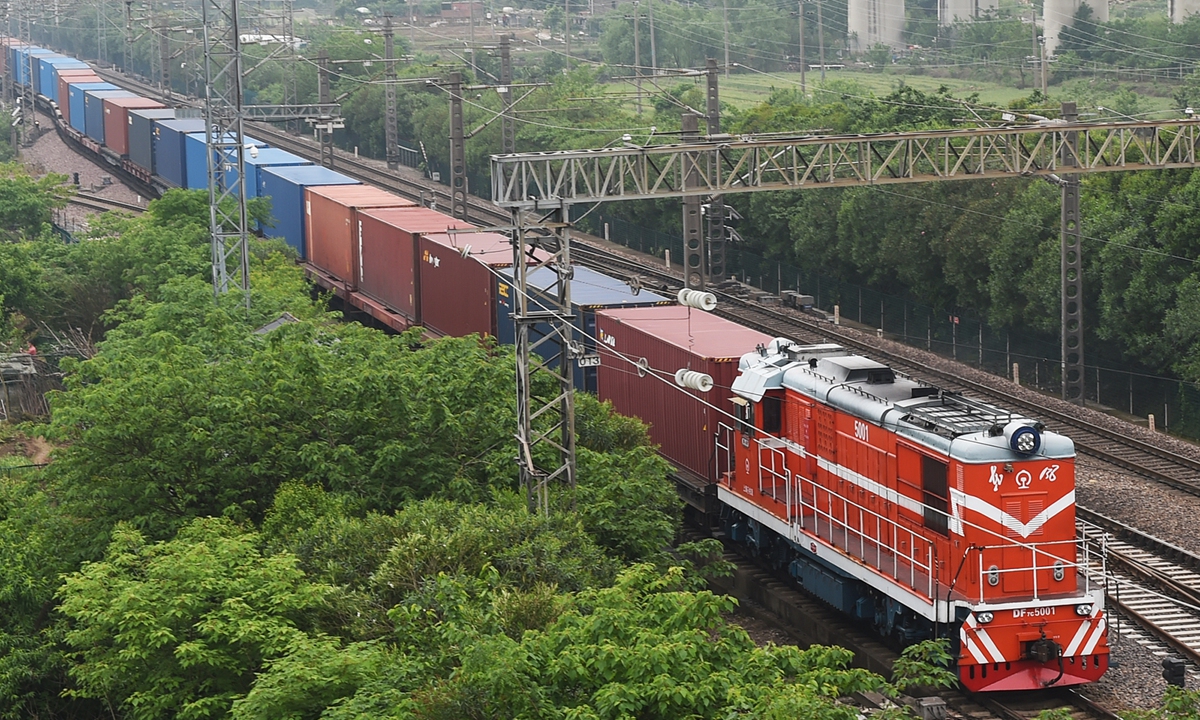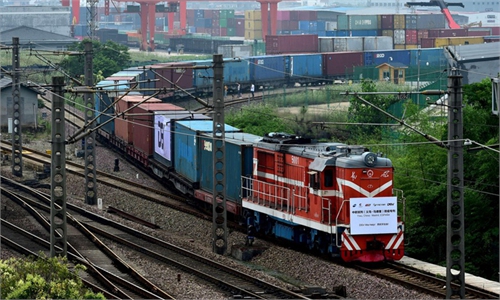Yiwu's 200b-yuan milestone injects confidence into China's foreign trade recovery for H2
China's export outlook remains resilient amid policy support, supply chain recovery

The 500th "Yiwu-Xinjiang-Europe" China-Europe freight train departed from Yiwu in East China's Zhejiang Province bound for Madrid, Spain on May 1, 2022. Photo: VCG
Yiwu, the world's largest commodity wholesale market, saw its foreign trade hit a milestone of 200 billion yuan ($29.62 billion) in the first half of the year thanks to policy dividends and the development of new foreign trade models like contact-less cross-border e-commerce.
A barometer of China's overall trade situation, Yiwu's sound performance has injected confidence for a further recovery of the country's foreign trade sector in the second half of the year, experts noted, predicting a better-than-expected bounce back.
"We're busier this year and the employees are working overtime to get orders finished on time," Cai Qinliang, secretary general of the Industry Association of Christmas Supplies in Yiwu in East China's Zhejiang Province, told the Global Times on Sunday.
Our overseas orders have been stable so far this year, with an increase of around 5-10 percent year-on-year, he said, noting that the overall business has almost returned to the pre-pandemic level.
"The resurgence of COVID-19 in the Yangtze River Delta region and the spillover impact of the outbreak in Shanghai had a slight impact on our manufacturing, thanks to the effective control of the resurgence," Cai said.
In the first half of the year, Yiwu's total import and export trade volume jumped 32.8 percent on a yearly basis to hit 222.3 billion yuan, according to a report on the WeChat account of local government information office, citing customs data.
Over the period, the city's export rose 28.3 percent year-on-year to 203 billion yuan, with labor-intensive products accounting for a large proportion while the export of high-tech products nearly doubling.

Customers buy stationery at the Yiwu International Expo Center during a three-day Yiwu Stationery and Gifts Exhibition in Jinhua, Zhejiang Province, on July 3, 2022. Photo: VCG
In sign of strong foreign trade resilience and complete industrial chain support, Yiwu's imports and exports staged sound performance between January and June despite sporadic COVID-19 flare-ups across China and increasing competition from Southeast Asia, according to Bai Ming, deputy director of the international market research institute at the Chinese Academy of International Trade and Economic Cooperation.Yiwu also benefited from dividends brought about by the Belt and Road Initiative, the Regional Comprehensive Economic Partnership (RCEP), China-Europe Railway Express network as well as the establishment of pilot free trade zones, thanks to decrease in trade costs, Bai told the Global Times on Sunday.
Yiwu market, a shopping hub for China's small commodities, opened in Dubai on June 30, China News Agency reported. With an investment of 1.06 billion yuan, the market will offer an alternative for overseas purchasers to buy made-in-China products without coming to China.
Amid the fallout of the COVID-19 on traditional foreign trade, cross-border e-commerce also showed strong growth momentum. Chinese exporters and logistics firms took a variety of measures to mitigate the negative impact on cross-border logistics, including building overseas warehouses and adjusting shipment methods.
According to data from the Ministry of Commerce, China's total number of overseas warehouses now tops 2,000, with a total floor space of 16 million square meters, 90 percent of which are located in North America, European and Asian markets.
The cross-border logistics via DHgate has been basically normal despite the sporadic COVID-19 flare-ups, as the platform helps merchants send goods overseas by changing ports and rerouting to shipping rather than air transport, domestic B2B cross-border e-commerce marketplace DHgate, told the Global Times.
In spite of soaring international shipping costs during the spring, the company's smart logistics platform DHLink saved over 10 percent on freight costs for domestic merchants by identifying orders made by the same overseas buyers through big data and then combining parcels.
Resilient outlook
As a barometer of China's foreign trade, Yiwu's sound performance reflects how the country's imports and exports have been navigating the difficulties of domestic COVID-19 resurgences and external uncertainties.
Over the first six months of the year, the country's foreign trade expanded 9.4 percent year-on-year to 19.8 trillion yuan ($2.94 trillion), thanks to a number of financial and fiscal support measures for pandemic-hit foreign trade enterprises and spark the vitality for key market players.
The Export-Import Bank of China provided loans worth 920 billion yuan to the foreign trade sector during the period, up 22 percent year-on-year, state-owned broadcaster CCTV reported on Sunday.
Despite some unstable and uncertain factors, China's foreign trade is expected to maintain steady growth in the second half of the year, Li Kuiwen, spokesperson from the General Administration of Customs said at a press conference on July 13.
Experts noted that the implementation of a basket of policies to stabilize foreign trade, the restoration of industrial and supply chains as well as the recovery of the overseas manufacturing sector will further drive up China's export growth.
Looking forward, the country's foreign trade is able to extend June's momentum to achieve double-digit growth in the second half of the year, if developed economies such as the US and the EU managed to decelerate financial tightening and avoid potential economic recession and thereby spark international demand, Bai noted.



